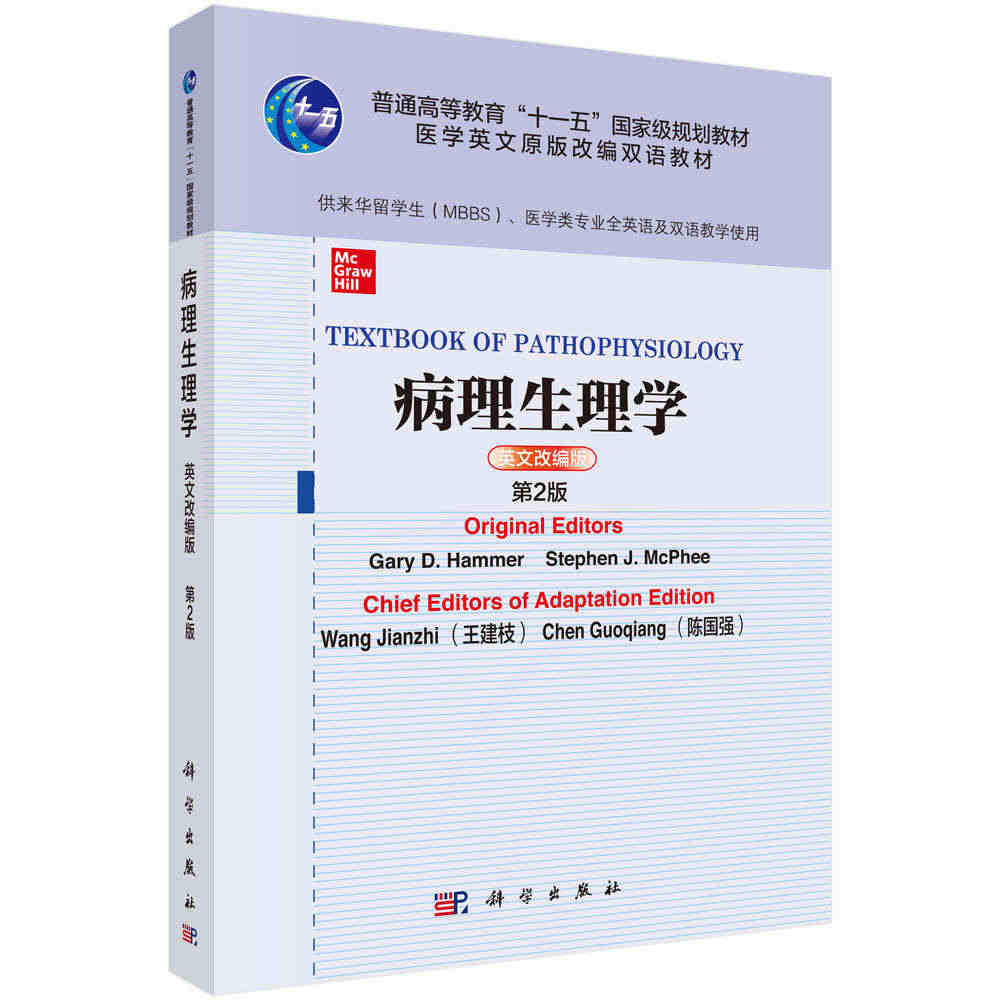
商品参数
| KX 病理生理学 英文改编版 第2版 |
 |
定价 |
158.00 |
| 出版社 |
科学出版社 |
| 版次 |
2 |
| 出版时间 |
2021年03月 |
| 开本 |
1041.00 |
| 作者 |
(美)加里·哈默,(美)史蒂芬·麦克菲 |
| 装帧 |
1042.00 |
| 页数 |
278 |
| 字数 |
427000 |
| ISBN编码 |
9787030682369 |

内容介绍
This book is composed of twenty-one chapters that can be further divided into four parts: (i) A brief introduction to pathophysiology and the disease. (ii) The cellular and molecular pathophysiology including deregulation of signal transduction and mechanisms underlying aberrant cell proliferation, differentiation and death. (iii) The fundamental pathological processes that can appear in different diseases, including fluid and electrolyte imbalance, acid and base disturbance, glucose metabolism disorder, lipid metabolism disorders, stress, fever, edema, ischemia and reperfusion, shock, multi-organic dysfunction, and hypoxia. Knowledge of these basic pathophysiological processe is essential for understanding the general mechanisms underlying most of the diseases. (iv) The organ dysfunctions including heart, lung, liver, kidney and the brain. The focus in his last part is still on the pathological processes and the mechanisms underlying the organ insufficiency or failure. Each chapter is organized by the segments emphasizing respectively the general concepts, the etiology and pathogenesis, the alterations of metabolism and the function, and as well as the principles for the prevention and therapies, which are also the key for teaching and learning in pathophysiology courses.The clinical doctors can choose the book as a refresher and update their understanding the mechanisms of diseases. Nurses and other practitioners will find that the concise format and broad/new scope of the book facilitate their understanding of basic disease entities.

目录
Chapter 1 Introduction of Disease 1
1.1 Concept of Disease 1
1.2 Etiology of Disease 1
1.3 Pathogenesis of Disease 3
1.4 Outcome of Disease 4Chapter
2 Abnormality of Cellular Signal Transduction and Related Diseases 6
2.1 Overview of Cell Signal Transduction 6
2.2 Mechanisms of Abnormal Cell Signal Transduction 10
2.3 Cell Signal Transduction Abnormality and Diseases 11
2.4 Pathophysiological Basis of Prevention and Treatment 15
Chapter 3 Abnormal Cell Proliferation, Differentiation and Related Diseases 17
3.1 Deregulated Cell Proliferation and Associated Diseases 17
3.2 Role of Abnormal Cell Cycle in the Pathogenesis of Disease 21
3.3 Deregulated Differentiation and Associated Diseases 22
Chapter 4 Apoptosis and Related Disease 27
4.1 Concept of Apoptosis 27
4.2 Phases of Apoptosis 27
4.3 Apoptosis Regulation 28
4.4 Other Types of Cell Death 31
Chapter 5 Fluid and Electrolyte Balance and Imbalance 34
5.1 Fluid and Electrolyte Balance 34
5.2 Imbalance of Water and Sodium Metabolism 41
5.3 Disorder of Potassium Metabolism 51
5.4 Disturbances of Magnesium Metabolism 60
5.5 Disorders of Calcium and Phosphorus Metabolism 63
Chapter 6 Acid-Base Balance and Imbalance 72
6.1 Normal Acid-Base Balance 72
6.2 Parameters of Acid-Base Balance 76
6.3 Simple Acid-Base Disturbance 78
6.4 Mixed Acid-Base Disturbances 82
6.5 Guidelines for the Diagnosis of Acid-Base Disturbances 83
Chapter 7 Glucose Metabolism Disorders 86
7.1 A General Introduction 86
7.2 Hyperglycemia 86
7.3 Hypoglycemia 96
Chapter 8 Lipid Metabolic Disorder 98
8.1 Overview of Lipid Metabolism 98
8.2 Hyperlipidemia 102
8.3 Hypolipoproteinemia 107
Chapter 9 Inflammation 110
9.1 Etiology of Inflammation 110
9.2 Classification of Inflammation 111
9.3 Mechanism of Inflammation 112
9.4 Outcomes of Acute Inflammation 124
9.5 Pathophysiological Manifestation of Inflammation 125
9.6 Pathophysiological Basis of Treatment 126
Chapter 10 Fever 128
10.1 General Introduction 128
10.2 Etiology 129
10.3 Pathogenesis 130
Chapter 11 Stress 134
11.1 Overview 134
11.2 Physical Reactions In Stress 135
11.3 Psychological Stress 141
11.4 Metabolic and Functional Alterations and Stress Associated Illness 142
11.5 Coping Principles of Pathological Stress 147
Chapter 12 Hypoxia 148
12.1 Parameters of Blood Oxygen 148
12.2 Classification, Etiology and Mechanisms of Hypoxia 148
12.3 Alterations of Metabolism and Function 150
12.4 Alterations in Central Nerve System 152
12.5 Alterations of Tissues and Cells 152
12.6 Factors Influencing Tolerance to Hypoxia 153
12.7 Oxygen Therapy and Oxygen Intoxication 153
Chapter 13 Ischemia-Reperfusion Injury 155
13.1 General Introduction 155
13.2 Etiology 155
13.3 Pathogenesis of Ischemia-Reperfusion Injury 155
13.4 Alterations of Metabolism and Function 159
13.5 Pathophysiological Basis of Prevention and Treatment 160
Chapter 14 Shock 163
14.1 Etiology 163
14.2 Classification 164
14.3 Pathogenesis 168
14.4 Alterations of Metabolism and Function 175
14.5 Pathophysiologic Basis of Prevention and Treatment 178
Chapter 15 Coagulation and Anticoagulation Imbalance 180
15.1 Overview of Balance between Coagulation and Anticoagulation 180
15.2 Disseminated Intravascular Coagulation 187
Chapter 16 Heart Failure 192
16.1 Causes and Precipitating Factors 192
16.2 Classification 193
16.3 Compensatory and Adaptive Response 195
16.4 Pathogenesis 198
16.5 Pathophysiologic Basis of Clinical Manisfestation 201
16.6 Pathophysiologic Basis of Prevention and Treatment 203
Chapter 17 Respiratory Failure 205
17.1 Etiology and Pathogenesis 205
17.2 Alterations of Function and Metabolism 208
17.3 Pathophysiological Basis of Treatment 209
Chapter 18 Hepatic Insufficiency 212
18.1 General Introduction—Liver Structure and Function 212
18.2 Hepatic Insufficiency 212
18.3 Hepatic Encephalopathy 216
18.4 Hepatorenal Syndrome 223
Chapter 19 Renal Dysfunction 226
19.1 Acute Renal Failure 226
19.2 Chronic Renal Failure 230
19.3 Uremia 234
Chapter 20 Brain Dysfunction 237
20.1 A General Introduction 237
20.2 Cognitive Disorders 237
20.3 Consciousness Disorder 243
Chapter 21 Multiple Organ Dysfunction Syndrome 248
21.1 Overview 248
21.2 Pathogenesis of MODS 249
21.3 Systemic Inflammatory Response Syndrome (SIRS) 250
21.4 Sepsis 256
21.5 Multiple Organ Dysfunction Syndrome 262
INDEX 272





 ¥215.00
¥215.00
 ¥269.00
¥269.00
 ¥198.00
¥198.00
 ¥215.00
¥215.00
 ¥734.95
¥734.95
 ¥108.00
¥108.00
 ¥199.00
¥199.00
 ¥95.00
¥95.00
 ¥119.00
¥119.00
 ¥137.00
¥137.00